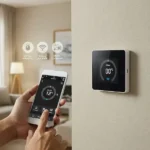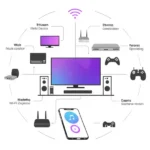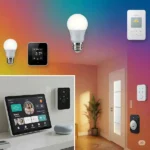Smart Home Hubs: The Brains Behind Your Connected Home
Why You Need a Smart Home Hub
Imagine having a dozen smart devices from different brands – lights, thermostats, locks, and speakers. Without a hub, you’d need multiple apps to control them all. Smart home hubs solve this problem by acting as a central control point, connecting all your devices and allowing you to manage them from a single app or with voice commands.
Usefulness of Using a Hub
- Centralized Control: Manage all your smart devices from one app, simplifying your smart home experience.
- Interoperability: Connect devices from different manufacturers, allowing them to work together seamlessly.
- Automation: Create routines and scenes to automate tasks, like turning off all lights when you leave.
- Enhanced Functionality: Some hubs offer advanced features like local control, ensuring your smart home continues to work even if the internet goes down.
Best Smart Home Hubs
Choosing the right smart home hub can be tricky, as there are many options with varying features and compatibility. Here’s a comparison chart highlighting some of the most popular and prominent smart home hubs, focusing on key aspects to help you make an informed decision.
Smart Home Hubs – Features Comparison Chart
| Feature/Hub | Amazon Echo (4th Gen) | Aeotec Smart Home Hub (SmartThings) | Apple HomePod Mini | Google Nest Hub Max | Hubitat Elevation | Home Assistant (Open Source) |
|---|---|---|---|---|---|---|
| Primary Ecosystem | Amazon Alexa | SmartThings (Samsung) | Apple HomeKit | Google Home | Independent (Local) | Highly Customizable |
| Voice Assistant | Alexa | Alexa, Google Assistant | Siri | Google Assistant | No built-in | Can integrate with various |
| Connectivity Protocols | Wi-Fi, Bluetooth, Zigbee, Matter, Sidewalk | Wi-Fi, Bluetooth, Zigbee, Z-Wave, Matter | Wi-Fi, Bluetooth, Thread, Matter | Wi-Fi, Bluetooth, Thread | Wi-Fi, Zigbee, Z-Wave | Wi-Fi, Bluetooth, Zigbee, Z-Wave, Thread, Matter, and more (via dongles/add-ons) |
| Local Control | Limited (some Zigbee devices) | Yes (for many devices) | Yes (HomeKit devices) | Limited | Yes (Primary focus) | Yes (Primary focus) |
| Cloud Dependency | High | Moderate (requires cloud for some features) | Low | High | Low | Low (can be mostly local) |
| Ease of Setup | Easy | Moderate | Easy | Easy | Moderate (can be complex for advanced features) | Advanced (requires technical knowledge) |
| Device Compatibility | Wide range of Alexa-compatible devices, limited direct Zigbee | Very wide (Zigbee, Z-Wave, Wi-Fi) | Limited to HomeKit-certified devices | Wide range of Google Assistant compatible devices | Very wide (Zigbee, Z-Wave, many integrations) | Extremely wide (community-driven integrations) |
| User Interface | Alexa App, voice, Echo Show display | SmartThings App | Home App, Siri | Google Home App, Nest Hub display | Web interface, limited app | Web interface, companion app |
| Privacy Focus | Standard | Standard | High (local processing, encryption) | Standard | High (local processing) | High (user control over data) |
| Advanced Automation | Routines | Complex Routines, SmartApps | Automations | Routines | Rule Machine, WebCoRE | Highly customizable, scripting |
| Typical Cost | Low to Mid-range | Mid-range | Mid-range | Mid to High-range (for display hubs) | Mid-range | Free (software), Hardware cost for server/dongles |
| Best For | Alexa users, beginners, voice control focus | Mixed device ecosystems, Z-Wave/Zigbee users | Apple users, HomeKit enthusiasts | Google ecosystem users, smart display functionality | Tech-savvy users, privacy-conscious, local control | Advanced users, maximum customization, open-source advocates |
Key Considerations When Choosing a Smart Home Hub:
- Your Existing Devices: The most important factor is compatibility with the smart devices you already own or plan to buy.
- Preferred Voice Assistant: If you’re tied to Alexa, Google Assistant, or Siri, this will narrow down your choices significantly.
- Technical Comfort Level: Some hubs are “plug and play,” while others require more technical expertise for setup and advanced automations.
- Local vs. Cloud Control: Local control offers better privacy and reliability (doesn’t depend on internet connection for basic functions), while cloud control often provides easier setup and remote access.
- Privacy Concerns: If data privacy is a top priority, look for hubs that emphasize local processing and strong encryption.
- Desired Automation Complexity: Simple routines are available on most hubs, but complex, conditional automations may require more advanced platforms.
- Budget: Smart home hubs range from affordable smart speakers with basic hub capabilities to dedicated, more expensive devices with extensive protocol support.
This chart should give you a good starting point for comparing popular smart home hubs and deciding which one aligns best with your needs and preferences.
Pros and Cons of Smart Home Hubs
Pros:
- Convenience: Control all your devices from one place.
- Compatibility: Connect devices that might not otherwise work together.
- Automation: Create routines to simplify your life.
- Energy Efficiency: Control devices to optimize energy usage.
- Enhanced Security: Integrate security devices for comprehensive home monitoring.
- Future-Proofing: Ensure your smart home remains compatible with new devices and technologies.
Cons:
- Cost: Initial investment can be significant.
- Complexity: Setting up and managing a hub can be complex for some users.
- Internet Dependency: Most hubs require a stable internet connection for full functionality.
- Security Concerns: Smart home systems can be vulnerable to hacking if not properly secured.
- Compatibility Issues: While hubs improve compatibility, some devices may still not work together.
Smart Home Hubs FAQ
Q: What is a smart home hub?
A: A smart home hub is a device that connects and controls all your smart home devices, allowing them to communicate and work together.
Q: Do I need a smart home hub?
A: If you have multiple smart devices from different brands, a hub is highly recommended for centralized control and automation.
Q: What types of devices can a smart home hub control?
A: Smart lights, thermostats, locks, security cameras, speakers, and many other smart devices can be controlled by a smart home hub.
Q: How do smart home hubs connect to devices?
A: Smart home hubs use various wireless protocols, including Wi-Fi, Zigbee, Z-Wave, and Bluetooth, to connect to smart devices.
Q: Are smart home hubs secure?
A: Security is crucial. Choose reputable brands, use strong passwords, and keep your hub’s firmware updated to protect your smart home.
Q: Can I control my smart home hub with my voice?
A: Many smart home hubs are compatible with voice assistants like Alexa, Google Assistant, and Siri, allowing for voice control.
Q: What happens if my internet goes down?
A: Some hubs offer local control, allowing some devices to continue functioning even without an internet connection.
Q: Are all smart home devices compatible with all hubs?
A: No. It’s crucial to check compatibility before purchasing devices and hubs. Matter is a new standard that aims to improve interoperability.
Additional helpful informaton
Explore useful smart home gadgets – Most Useful Smart Home Gadgets
Connect your smart home hub to Alexa or Google Home – Connect Smart Home Hub to Alexa & Google Home




